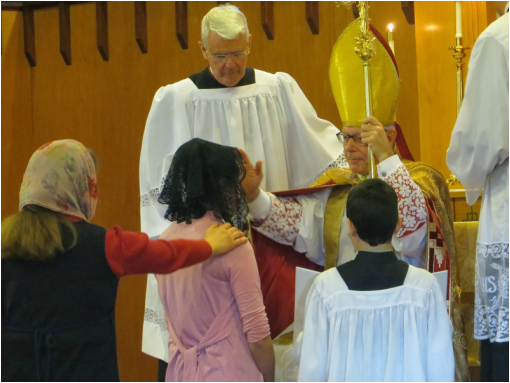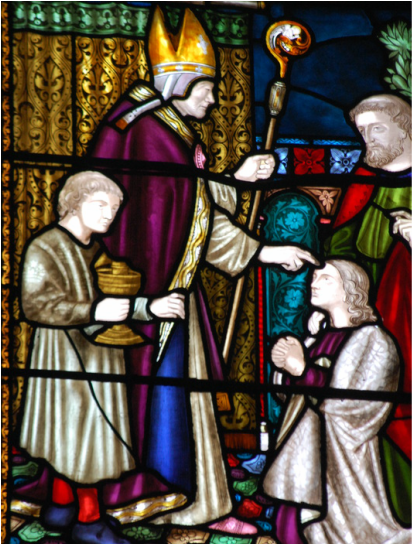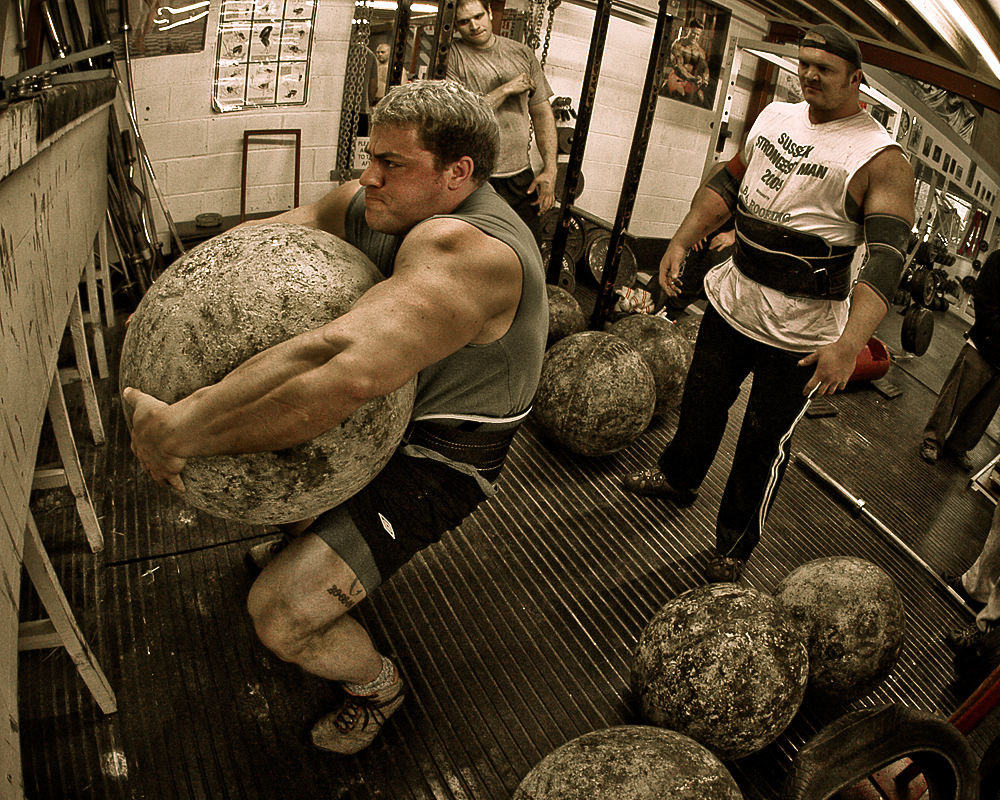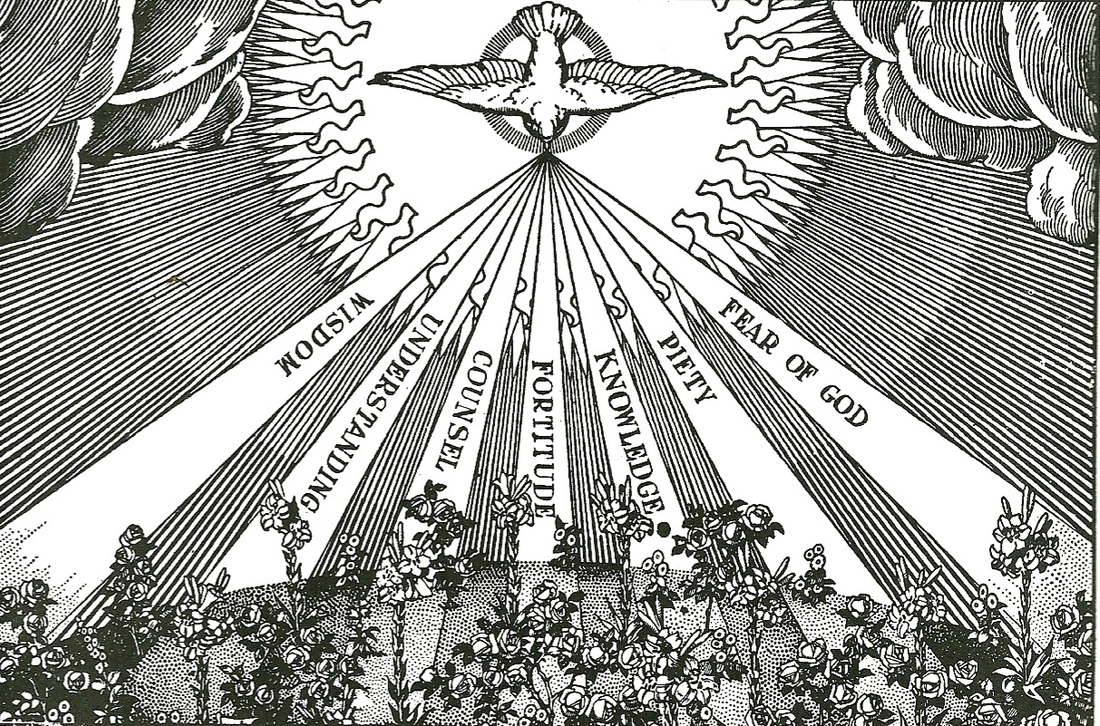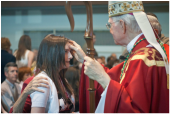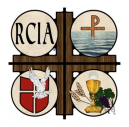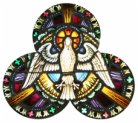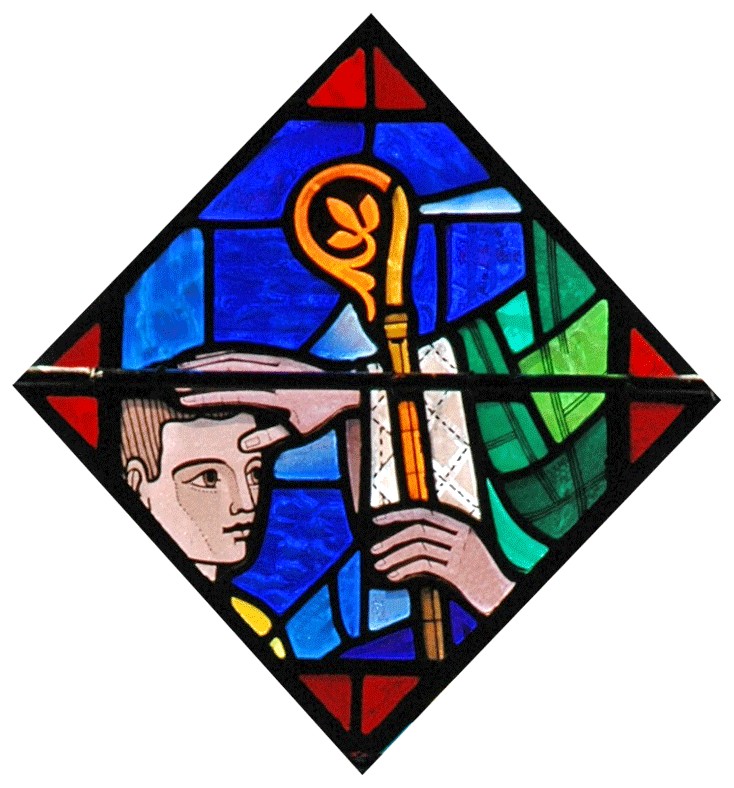|
|
Confirmation |
|
What is Confirmation?
Lets begin with a brief history.
Confirmation is the second of the three sacraments of initiation (Baptism, Confirmation, and First Eucharist). In the early Church these three sacraments were always celebrated by the Bishop in one continuous rite. Jesus commanded his disciples to:
Confirmation is the second of the three sacraments of initiation (Baptism, Confirmation, and First Eucharist). In the early Church these three sacraments were always celebrated by the Bishop in one continuous rite. Jesus commanded his disciples to:
Go, therefore, and make disciples of all nations, baptizing them in the name of the Father, and of the Son, and of the holy Spirit, teaching them to observe all that I have commanded you. (Mt 28:19-20) This means that it was the mission of the Church to grow, and to spread the Gospel. As the Church grew in numbers it became more and more difficult for Bishops to administer all three of the sacraments of initiation to all of their people. This led Bishops to delegate the sacraments of initiation to their priests, who act as vicars for the bishop. In the Western Church the desire was to keep a connection with the Bishop as chief shepherd of his diocese, and so Confirmation was separated from Baptism and First Eucharist, to be bestowed by the Bishop.
In the East the desire was to retain the integrity of the continuous rite of initiation, and so Baptism, Confirmation (or Chrismation), and First Eucharist were all delegated to the parish priests, to be bestowed in one continuous rite to infants. By now you might be a bit confused by the order in which the sacraments are received. The traditional order, which is retained in R.C.I.A. is Baptism, Confirmation, Eucharist. In practice today most Catholics receive them in this order: Baptism, Eucharist, Confirmation. |
Why the change?
Pope St. Pius X (Pope from 1903-1914) was deeply devoted to the Eucharist. He said, "Holy Communion is the shortest and safest way to Heaven." This led him in to issue the decree Quam Singulari in 1910 which lowered the age of reception of the Eucharist from the minimum age of 12 to the "age of discretion" (roughly age 7). Since it was the norm for children to be confirmed just before First Communion, in many places confirmation was still bestowed at a young age. However, due to concern about parents keeping their children in Faith Formation, and the desire by many for children to better understand what they were receiving, in 1932 permission was given to administer Confirmation after First Eucharist. This exception became the norm, and remains so for most dioceses today.
The debate about the age of Confirmation continues, and there are valid arguments on either side of the issue. One of the problems that crept in with these changes was that many erroneously understand the Sacrament of Confirmation to be akin to a Bar Mitzvah, an attaining of maturity or adulthood in the Church. The Catechism of the Catholic Church warns against this erroneous assumption, saying:
The debate about the age of Confirmation continues, and there are valid arguments on either side of the issue. One of the problems that crept in with these changes was that many erroneously understand the Sacrament of Confirmation to be akin to a Bar Mitzvah, an attaining of maturity or adulthood in the Church. The Catechism of the Catholic Church warns against this erroneous assumption, saying:
Although Confirmation is sometimes called the 'sacrament of Christian maturity,' we must not confuse adult faith with the adult age of natural growth, nor forget that the baptismal grace is a grace of free, unmerited election and does not need 'ratification' to become effective. (CCC 1308)
Confirmation ultimately is a sacrament of STRENGTHENING. It strengthens the sevenfold Gifts of the Holy Spirit received at Baptism, and initiates us into the mission of the Church.
The Rite of ConfirmationConfirmation is conferred by the Bishop, who anoints the candidate with sacred chrism on the forehead and lays his hand on the forehead while saying the words: “Be sealed with the gift of the Holy Spirit.” The gift of the Holy Spirit is really the seven Gifts of the Spirit, beautifully enumerated in the prayer that accompanies the laying on of hands:
"Send your Holy Spirit upon them to be their helper and guide. Give them the spirit of wisdom and understanding, the spirit of right judgment and courage, the spirit of knowledge and reverence. Fill them with the spirit of wonder and awe in your presence." (Rite of Confirmation) |
“It is part of your vocation to shout the Gospel from the rooftops, not by your words, but by your life.” |
What does Confirmation do?Since Sacraments always DO SOMETHING, Confirmation is no different. It does a couple of things. First and foremost, it strengthens the gifts of the Holy Spirit received at Baptism. Confirmation also initiates us into the Mission of the Church, which is to "Go therefore and make disciples of all nations." (Mt 28:19) Confirmation is NOT graduation from CCD, a Catholic "bar mitzva," adulthood in the Church, or a way of confirming one's faith. God confirms, not us. Basically, Confirmation makes us Knights for God's Church, filled with the Gifts of the Holy Spirit, we go out into the world proclaiming the Gospel and making disciples; it makes us Apostles.
|
What are the Gifts of the Spirit?
The sevenfold Gifts of the Spirit are enumerated in Isaiah 11:2-3. They are: Wisdom, Understanding, Counsel, Knowledge, Fortitude, Piety, and Fear of the Lord (Awe).
Who can be confirmed?
Normally, in the United States, Catholics are confirmed between 8th and 11th Grade. Each diocese does it a little bit differently. For example, in the Diocese of Portland, ME (just next door) children are confirmed before receiving their First Holy Communion at the age of seven. In the Eastern Churches Confirmation is not separated from Baptism and First Eucharist; thus infants are Baptized, Confirmed, and receive their First Holy Communion in one continuous rite—similar to what converts experience at the Easter Vigil.
Strictly speaking, any baptized person can be confirmed at any point in time having been catechized and prepared for reception of the sacrament. Those who were baptized in other Christian communities who want to become Catholic are confirmed at the Easter Vigil.
Strictly speaking, any baptized person can be confirmed at any point in time having been catechized and prepared for reception of the sacrament. Those who were baptized in other Christian communities who want to become Catholic are confirmed at the Easter Vigil.
Why do we even have Confirmation?
The Sacrament of Confirmation at St. André Bessette Parish
Normally the Sacrament of Confirmation is bestowed in High School. For more information about High School Confirmation go to the High School Confirmation page.
If you are an adult and never were confirmed, but have received your First Holy Communion, and you would like to be confirmed, then Adult Confirmation is for you. Twice per year the Bishop of Manchester does a special Confirmation for adults. The parishes in the Lakes Region of NH work together to provide the necessary catechesis for Adult Confirmation candidates.
If you have been baptized in the Catholic Church, but were not catechized as a child and never received either your First Holy Communion or the Sacrament of Confirmation, then R.C.I.A. is the place for you. Candidates in R.C.I.A. are Confirmed and receive their First Holy Communion at the great Easter Vigil, one of the most beautiful liturgies of the Church.
If you are an adult and never were confirmed, but have received your First Holy Communion, and you would like to be confirmed, then Adult Confirmation is for you. Twice per year the Bishop of Manchester does a special Confirmation for adults. The parishes in the Lakes Region of NH work together to provide the necessary catechesis for Adult Confirmation candidates.
If you have been baptized in the Catholic Church, but were not catechized as a child and never received either your First Holy Communion or the Sacrament of Confirmation, then R.C.I.A. is the place for you. Candidates in R.C.I.A. are Confirmed and receive their First Holy Communion at the great Easter Vigil, one of the most beautiful liturgies of the Church.
Where can I get more information about the Sacrament of Confirmation at St. André Bessette Parish?
If you were never confirmed and are interested in adult confirmation you can contact Fr. Marc Drouin at the parish office,
(603) 524-9609, or submit a question below.
If you're a parent and you would like to enroll your son or daughter in High School Confirmation Prep, or you are interested in R.C.I.A., you can contact our parish Evangelist, Seth Evangelho at (603) 524-9609 ext. 27, or submit a question below.
(603) 524-9609, or submit a question below.
If you're a parent and you would like to enroll your son or daughter in High School Confirmation Prep, or you are interested in R.C.I.A., you can contact our parish Evangelist, Seth Evangelho at (603) 524-9609 ext. 27, or submit a question below.

